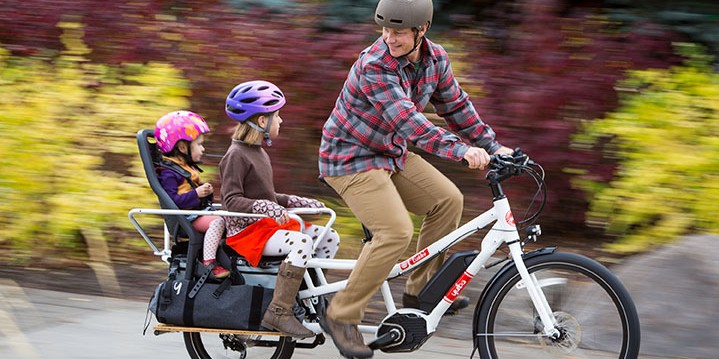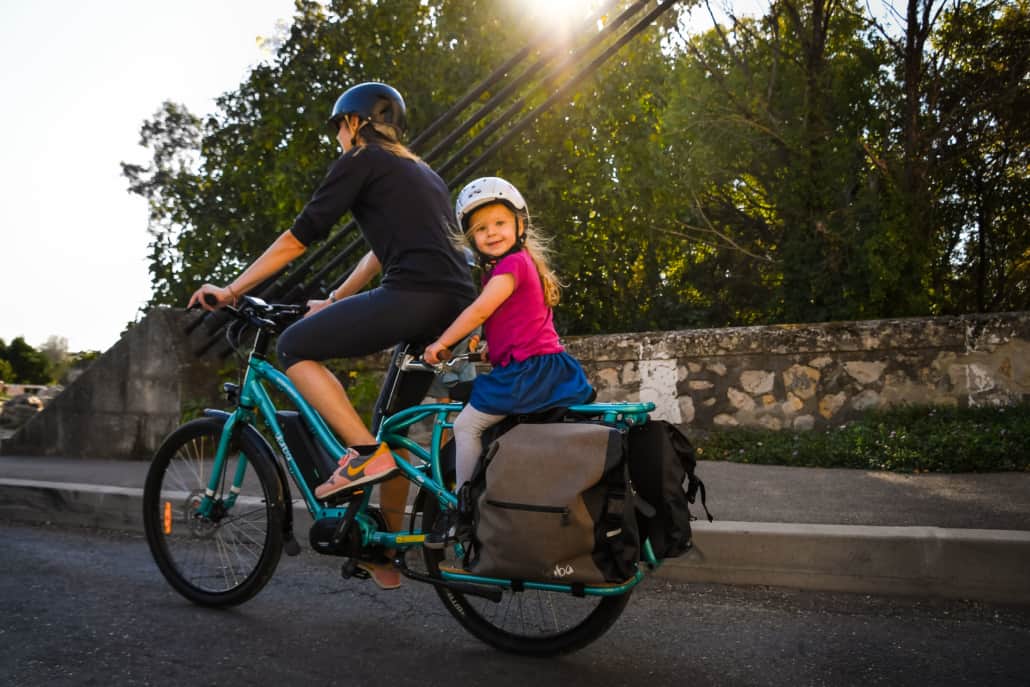
Frequently asked questions about SB 400: E-bike vouchers and bike share in the Clean Cars 4 All program
What is SB 400?
SB 400 (Umberg-Santa Ana), signed into law on September 6th, 2019, expands the eligible modes of transportation for which the Clean Cars 4 All program “mobility option” may include bike sharing and electric bikes. Our e-bike voucher FAQs provide information about who can use this program and how to access it.
How Do I Trade in My Car for an E-Bike?
First, call your local Air District (see the list below) and ask them how to apply for a voucher. They may not have a program in place yet, but they should be able to tell you when they will be ready to exchange your car for an e-bike.
UPDATE: As of February 2021, only the Bay Area Air Quality Management District has a program in place.
What is the Clean Cars 4 All program?
Clean Cars 4 All is a program of the California Air Resources Board. It provides incentives to lower-income California drivers to scrap their older, high-polluting car and replace it with a zero- or near-zero emission replacement.
The program allows participants to select a “mobility option” as an alternative to a vehicle in regions in California where the Air District implements the program. Mobility options are vouchers for public transit or car sharing, and now, bike sharing memberships or electric bicycles. The program aims to focus the benefits of the program to low-income and disadvantaged communities. It has a heavy emphasis on consumer protections, education on new technologies, and coordination with other clean transportation programs.
What are the income limits that apply to the Clean Cars 4 All program?
Your household income must be less than 400% of the federal poverty level to be eligible for the the mobility options in the Clean Cars 4 All program. You can find a chart with those amounts here.
Which Air Districts have a Clean Cars 4 All program?
The Air Districts that currently have a Clean Cars 4 All program include the vast majority of California’s population: the San Joaquin Valley Air Pollution Control District, the South Coast Air Quality Management District, and the Bay Area Air Quality Management District.
Counties in these air districts and eligible for the program include:
- Alameda
- Contra Costa
- Fresno
- Kern County (top part that straddles the Sierra Nevada and Tehachapi mountains)
- Kings
- Los Angeles (most but not all of the county)
- Madera
- Marin
- Merced
- Napa
- Orange
- Riverside (parts of the county)
- San Bernardino (parts of the county)
- San Francisco
- San Joaquin
- San Mateo
- Santa Clara
- Solano (southwest portion only)
- Sonoma (southern portion only)
- Stanislaus
- Tulare
The Sacramento Metropolitan Air Quality District is currently in progress of creating their own Clean Cars 4 All programs. This program is expected to be up and running in the spring of 2020.
When will SB 400 go into effect?
SB 400 went into effect in January of 2020. That authorized air districts to offer e-bikes as an alternative. It will take some time for each air district to establish its own program.
How much will an e-bike voucher be?
Car vouchers offer up to $9,500 for a car and up to $2,000 per charging system. We don’t yet know how much the e-bike vouchers will be. The California Air Resources Board hasn’t issued guidelines yet. CalBike thinks the amount of an electric bike voucher should be equal to the electric car voucher in each district. This is up to $9,500, which would cover the whole cost of most electric bikes.
What is the process to apply for an e-bike voucher?
Reach out to your air district and fill out an application to see if your vehicle is eligible. Rules about eligibility vary by district. In general, eligible vehicles are older cars that cannot pass smog tests. If your application is approved, bring your current vehicle to an authorized dismantler to verify vehicle eligibility. Once your vehicle is verified you will be awarded a grant. You may take this grant to an authorized dealership to purchase or lease a new or used hybrid, plug-in, or electric vehicle OR collect a public transportation pass OR use it for an eligible e-bike or bike-share program.
What kind of e-bikes and bike-share would be eligible?
The rulemaking has not been completed. However, California Vehicle Code Section 312.5 defines electric bicycles as one of three types of bikes. One type of approved e-bikes can be pedaled like regular bikes but have motors that help up to speeds of 28 mph. The top speed is 20 mph on bikes that may also be operated by throttle.
What if my income is too high to qualify for the Clean Cars 4 All program?
If your household income is more than 400% of the federal poverty level, you may still be able to get a rebate when you trade in an old car. There are incentive programs available to everyone that also help with getting high emission vehicles off the road. These include the California Clean Vehicle Rebate Program, CVRP Rebate Now for San Diego County, Low Carbon Transportation Investments and Air Quality Improvement Program administered by CARB, and the Federal EV Tax Credit available through the end of 2019.
At the same time, CalBike is working to create a voucher program to support purchases of electric bicycles. Sign our e-bike rebate petition to help build the movement to create that program!
Where does the funding for the e-bike voucher program come from?
California’s Cap-and-Trade program.

